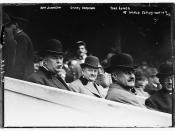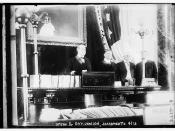There has long been a debate over the differences in leadership styles between men and women. Although there are few studies that confirm that there gender differences in leadership styles (Helgesen, 1990; Hennig and Jardin, 1977; Rosner, 1990), most research points to their absence (Bass and Stogdill, 1990; Dobbins and Platz, 1986; Donnell and Hall, 1980; Maccoby and Jacklin, 1974). However, strong and widely held perceptions of their existence continue (Heilman, et al, 1989; Mednick, 1989; Schein, 1973, 1975).
Most research in the area of gender and leadership role stereotyping in the workplace has focused on either self-perceptions or subordinates' perceptions of male and female leaders' behaviors (Bass and Stogdill, 1990; Eagly and Johnson, 1990). Significant differences have been found between the perceptions of these two groups. In most cases, earlier researches have indicated that leadership behaviors were reported more frequently by subordinates than by the leaders themselves (Field and Caldwell, 1979; Millard, 1981).
On the other hand, a landmark meta-analysis of leadership styles found leaders' self-ratings of their task and interpersonal styles to be significantly more gender role stereotypic the subordinates' ratings (Eagly and Johnson, 1990). These discrepancies in research suggest the importance of studying different perceptual sources of leaders' behavior and may provide more reasonable explanations into the nature of gender role stereotyping in organizations.
Many mangers both male and female agree that there are differences in management styles. Interestingly, both male and female mangers describe women's differences in positive terms. According to the Myers Briggs Type Indicator male managers consistently come out predominantly as Traditionalists. In contrast to female managers who emerge as significantly more "ÃÂintuitive', combined with either thinking as visionaries or feeling as catalysts. The natural strength of the visionary is being strategic, while that of the catalyst is fostering higher productivity by personally motivating...


![[Portrait of Bunk Johnson and Maude Johnson, Stuyvesant Casino, New York, N.Y., ca. June 1946] (LOC)](https://s.writework.com/uploads/17/171599/portrait-bunk-johnson-and-maude-johnson-stuyvesant-casino-n-thumb.jpg)
Gender in Management
The essay was able to show many viewpoints about the issue on men versus women managers. However, the conclusion did not really have a concrete stand, instead it cited other factors to answer the issue. Generally though, one can get several useful ideas to come up with a personal conclusion.
0 out of 0 people found this comment useful.